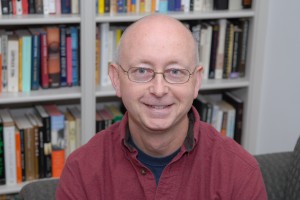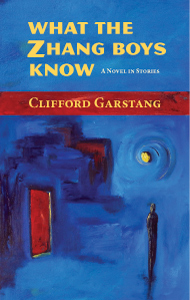Interviewed by Christopher Linforth
You recently won the prestigious Library of Virginia Award in Fiction for your book What the Zhang Boys Know. Tell us about how that came about and what it has meant to you and your writing.
The book’s publisher, Press 53, felt strongly about the book and nominated it for a number of awards. I know how difficult it is for a small press book to get attention, though, and given some of the amazing writers who have won the award in the past—Barbara Kingsolver, Richard Bausch, Deborah Eisenberg, to name just three—I didn’t really give it much thought. When I learned I was a finalist, I was thrilled, but realistic—after all, the other finalists were bestselling books from big publishers. Winning, then, was absolutely amazing. And I won’t say that it was vindication, but it is something of a validation, and that gives me a certain amount of confidence as I work on new projects.
You have two books published with Press 53, a small press located in North Carolina. Can you tell us about why you went with them and how you’ve found working with that press?
I suppose I would not have gone with Press 53 or any small press if I’d had access to major publishers. The truth of the business is that for the most part, the big presses are doing certain kinds of books that they know will sell lots of copies. That’s understandable. It’s a business. With my first book—a collection of linked short stories—agents and editors steered me toward small presses, which is how I came to Press 53. That experience was wonderful—they’re very hands on and available, open to suggestions, supportive. With Zhang Boys, my then-agent tried pretty hard to find a larger press that would take it, but we got a lot of polite rejections because they considered it just another story collection. But I was happy to return to Press 53 with it, especially when they reacted so enthusiastically to the book. Again, I found that they were open to ideas for the cover and design, to marketing, to appearances, and just about anything I thought of. The lesson I’ve learned is that small presses are playing an important role in the publishing world, filling a gap that the big presses have left as they pursue blockbusters.
If you would, could you talk to us about your writing life? What do you aim for in your fiction? Do you ever surprise yourself once you’ve finished a piece?
Honestly, I try to let instinct take over on the page, at least in a first draft. I’m of the school that likes to just bleed on the page and go back to clean up the mess later. As far as what I’m aiming for goes, I’d say I’m trying to tell a fresh, important story in language that’s pleasing to the ear. I do give a lot of thought to what I’m trying to say, because for me story is not just about plot. As for the language aspect, part of my process also involves reading the work aloud. Because the latter stages of the process involve hard work—revision is crucial, but hard—there aren’t many surprises. But because the subconscious is taking over in the early stages, I’m almost always surprised to read what I’ve written. Sometimes in a good way, sometimes not so good.
According to the bio on your website, you’ve had a varied and distinguished legal career working for Harvard, the World Bank, and a prominent law firm. What prompted the career change? Does your legal background help with researching your fiction or make its way into your stories?
Before I wanted to be a lawyer, and long before my international career took off, I wanted to write. That’s what I hoped to do when I went to college and that’s why I started in a Masters degree program in English right after college. But I took a much-needed break from school and joined the Peace Corps, a decision that changed my life. I was hooked on international travel and work, and so when I got back to grad school, I had a new ambition. I still thought I’d write, but it was definitely on the backburner. A couple of decades went by, my work was fascinating, rewarding, and demanding, and I’d only dabbled in writing. The dawn of the new millennium seemed like an auspicious time to make a course correction and get back to what I’d wanted to do originally. And I have to say, my legal work itself hasn’t up to now made its way into my fiction. (Having said that, my new project is about a lawyer, so we’ll see how that goes.) What does have a huge impact on my work, though, is all the travel and overseas living I’ve done in my career. It seems as though everything I write has an international aspect to it. In my first book, a couple of the characters go to China to adopt a baby. In the second book, China again is a secondary setting. Korea plays an important part in the novel I’ve just finished. It looks like that’s going to be a permanent part of who I am as a writer.
What do you think distinguishes writers who get work published from those who don’t? Do you have any advice for writers ready to take that next step?
It’s almost a cliché at this point, but it’s true: the writers who get published are the ones who didn’t give up. You need perseverance. While there is a place for self-publishing, I would encourage writers to be patient with traditional publishing. We’re not all going to break through to the big publishers—I may always be a small press guy. But there are a lot of publishers out there, large, medium, and small, and if your work is good, you’ll find someone to bring your work out. Keep working at the craft and making yourself a better writer.
What are you currently working on?
I’ve recently finished a novel set partly in Virginia and partly in Korea and I’m hopeful my new agent will soon be getting that out to publishers. I’m just starting the editorial work on a short story anthology that Press 53 will publish next fall called Everywhere Stories: Short Fiction from a Small Planet. It will include short stories set around the globe, and if it goes well may be a series. That’s in addition to my duties as editor of Prime Number Magazine, where I edit the fiction and also coordinate the work of the other editors. As far as my own writing goes, I’ve got two projects in the works—one a quasi-historical novel set in Southeast Asia and the other novel set in Virginia that is, at least for me, experimental.
Buy from the publisher
Buy from Amazon
Find more Clifford Garstang at his website
Find Prime Number Magazine here

